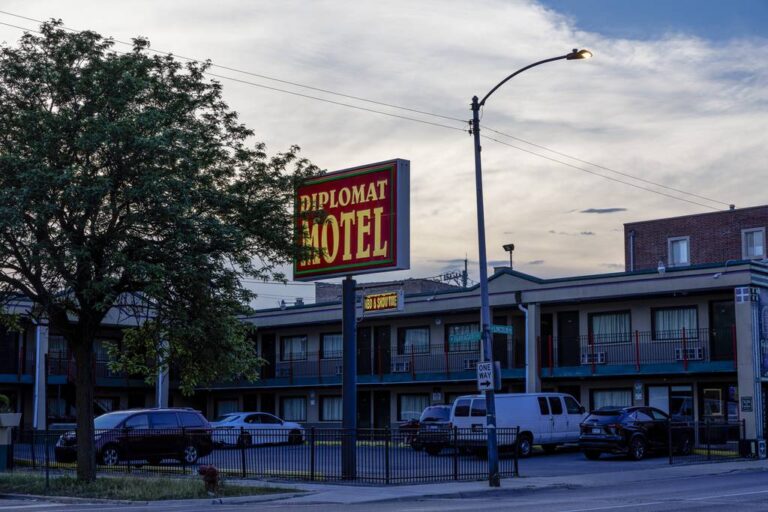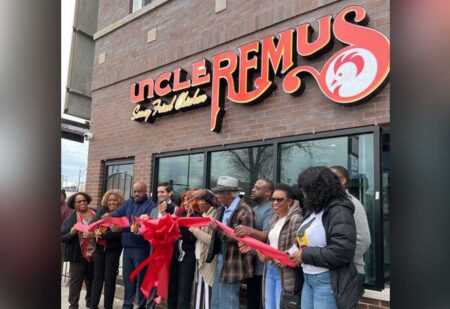Chicago officials are closing in on plans to transform a budget motel along North Lincoln Avenue into a housing pilot that would provide on-site substance abuse and mental health treatment — part of the city’s long-term efforts to combat chronic homelessness by pairing temporary shelter with intensive health care.
The City Council is slated to vote Wednesday on the $2.9 million purchase of the Diplomat Motel. That’s where the city plans to test a new “stabilization” shelter model whose goal is to transition homeless people into permanent housing by giving them their own rooms, as well as a host of medical and casework services. Next, the property will require a special-use zoning permit and modest renovations, with the aim to start the program in the first half of next year.
Located along the Lincoln Avenue corridor once known as a bustling thoroughfare for travelers seeking cheap lodging, the 20,000-square-foot building would have up to 40 private units available for stays of three to six months, Chicago Department of Public Health Deputy Commissioner Matt Richards said during a housing committee presentation last week. Participants will be those who are most often cycling through jail, emergency departments or other emergency services, and there will be access to doctors, nurses, psychiatrists, case managers, social workers and more.
“I think we see it as addressing an important gap within our housing and health system,” Richards told the Tribune. “We’re often offering some of our highest-need residents health care services without housing services, or we’re sometimes offering them housing without adequate services.”
The health department estimates the program could benefit about 120 residents each year who will receive three meals a day, laundry and security services. The pilot follows what city officials deem a successful run of a similar program during the onset of the COVID-19 pandemic, in which the city placed Chicagoans living on the street inside swanky downtown hotels where they could safely practice social distancing.
But the Lincoln Square motel will differ in that there will be rigorous treatment programs and round-the-clock social services for its residents — and also in that the two-story, California-style building is far less luxurious. It is part of a larger vision of the city where caring for residents with the most severe, complex behavioral challenges will improve their long-term outcomes and save overall city costs.
Department of Housing Commissioner Marisa Novara, who announced her resignation days ago, said the agency has never taken on a partnership like this before.
“I think it’s really important that government does what we’re doing here,” Novara said, “which is innovate, learn from things that we unexpectedly learned were working and had great outcomes for people and then try to figure out how to do more of it.”
Currently, the city is housing about 2,740 residents in its congregate homeless shelters, but the Chicago Coalition for the Homeless — which counts people who are temporarily staying with others as well — estimates upward of 65,000 Chicagoans experienced homelessness in 2020. City shelters for the homeless are separate from those serving the recent influx of migrants who largely hail from Central and South America and are awaiting asylum status from the U.S. government, but officials have said relief on either system would benefit the other as the city faces fiscal constraints in its overall social safety net.
Mayor Brandon Johnson campaigned on raising the city’s real estate transfer tax on properties priced above $1 million in order to combat the city’s homelessness crisis, even listing the proposal to funnel the new revenue into shelters and other social services in his 100-day agenda. But because the tax hike requires a change in Illinois law or a citywide referendum in an election, the soonest that could happen is this fall.
North Side Ald. Andre Vasquez, whose 40th Ward includes the Diplomat Motel and who led a community meeting about the proposal this spring, said that if this experiment works, the model could be used across Chicago as an alternative to the existing support system for the homeless that he likened to a “Band-Aid” solution.
“When you don’t have this kind of housing, they’re going to your E.R., CPD is following up, they’re coming back every single month, every couple of weeks,” Vasquez said at a committee meeting this month. “And you’re spending more tax dollars on that end, as opposed to having the wraparound services on the front end.”
Nonetheless, the startup costs will be pricey. CDPH is designating $12 million from the city’s portion of the federal pandemic relief program the American Rescue Plan Act, toward the first two to three years of the pilot’s health care and operational services, Richards said. After that, the cost is expected to be $3 million to $4 million a year, mostly for personnel. But Richards also noted that CDPH has other financial sources, such as recent opioid settlements, that could be tapped.
Richards argued that it will be cost-effective, given that tens of millions of dollars are spent every year among different systems — such as emergency rooms and homeless services — that people who need wraparound support usually frequent.
Meanwhile, the city Department of Housing has set aside $30 million, also in COVID-19 stimulus funds, for the Diplomat Motel acquisition and five other properties eyed for shelter operations, DOH program manager Meredith Muir said during the recent housing committee hearing. The renovations at the Diplomat would focus on making the building more accessible and would not top an estimated $1 million, she said.
Vasquez was bullish that the success of a pilot in his ward would convince the state and other funding sources to continue the program, with a goal of the Diplomat Motel model arriving in all 50 wards: “Your person that you see on the street doesn’t have to be on the street if everything else is wrapped around. And so this is probably the first of its kind in the city.”
But if results are lackluster, Vasquez said, he would advocate for the building to be converted into affordable housing. Metrics to evaluate progress include the percent reduction of emergency services, the number of individuals permanently housed and future health outcomes.
An estimated 1,200 homeless Chicagoans are chronically cycling between the criminal justice system and emergency departments to the cost of $300 million over four years, according to a study by the University of Chicago’s Urban Labs. Those individuals are largely suffering from substance use disorders, mental illnesses or other complex medical conditions.
But in a 2021 study in the Journal of the American Medical Association on the city’s pandemic-era pilot at Hotel 166 downtown, researchers found that participants had better health outcomes, including reduced blood pressure and sugar levels and increased intake of mental health and substance abuse recovery medications. Those results showed particular promise in treating two of the top five drivers of the Black-white life expectancy gap in Chicago: chronic health conditions and opioid addiction.
The model that CDPH dubs “Healthy Housing First” is also being explored by the state. The Illinois Housing Development Authority is issuing up to $75 million for affordable housing with additional services geared toward people who are disabled or at risk of homelessness. The state is currently seeking applications for the housing development stage through January.
The work from the agencies follows the receipt of $60 million from the U.S. Department of Housing and Urban Development in February and the announcement of a new partnership with Biden’s administration in May to fight homelessness.
“Here in Illinois, housing isn’t a privilege — it’s a right,” Gov. J.B. Pritzker wrote in a news release this month following the IHDA announcement. “Homelessness is not inevitable — and by investing in affordable housing and supportive services, we are moving one step closer to an Illinois where everyone has a roof over their head.”
One effort already underway is the Road Map Initiative, which involves nonprofit organizations such as Mercy Housing Lakefront, Heartland Alliance Health and Smart Policy Works.
Smart Policy Works and Heartland Alliance Health have worked with the Cook County Sheriff’s Office since fall 2022 to provide temporary housing for people cycling through the jail with complex behavioral health issues. They place individuals in hotels for one to two weeks before finding more permanent housing, with 27 participants in various phases of the program.
Smart Policy Works now meets with the Chicago health department regularly.
“If we were strategically aligning our housing and our health system and creating these intentional, collaborative approaches for caring for individuals, we would be seeing more success,” said Barbara Otto, president of Smart Policy Works. “I think the crisis stabilization housing at the Diplomat Motel is a gateway for that.”







